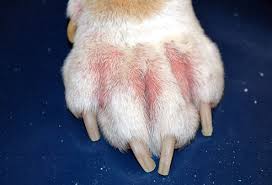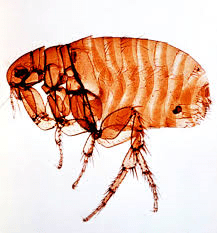In this blog I will address some commonly seen issues pets experience during spring time.
Allergies
Skin diseases are the most common reason for owners taking their pets to their vet. The affected pet licks, scratches or rubs itself excessively causing irritation or damage to its skin. Pets with allergies may be irritated all year round but many dogs have seasonal allergies to air-borne pollens, dust and other allergens. This is called atopy or atopic dermatitis, an inherited predisposition to develop sensitivity to common substances in the environment. It is more common in small breed dogs, including West Highland White terriers and Jack Russell Terriers. The disease can start in dogs from as young as six months and up to six years of age, and rarely develops in older dogs. Many individual dogs experience “flare-ups” in early spring with the new plant growth.

Digital dermatitis associated with atopy
Diagnosis is based on veterinary examination, often using a blood test or intra-dermal skin tests to identify the allergen. Effective treatment is available, either using immunotherapy or more commonly with anti-inflammatory medication such as corticosteroids or cyclosporin. Shampoos may be of benefit and occasionally antibiotics are needed to treat damaged skin.
Fleas

Now is a good time to examine your pets for fleas or flea stool using a flea comb and treat with a safe and effective product if necessary. There are a large variety of treatments available; unfortunately, many over-the-counter products are of little or no use although they may seem to be good value. It is important to get safe and effective treatments from your vet or at least ask for advice on which products are best suited to your home and pet.
Walking, exercise and traffic
Longer evenings and the feel of spring make exercising your dog more of a joy and longer walks in the countryside or on a beach more attractive. Continue to take great care with by keeping dogs on the leash, especially near traffic. Older or arthritic dogs may not up to more exercise, so don’t push them. There is a popular belief that the weight your pet may have put on over the winter can be lost by more exercise. This is not so, less food is the answer.
Cats, cat-bites and fights
The cat world is full of ‘romance’ at this time of the year. Unspayed female cats begin their reproductive cycle in response to the increasing length of day and Tom cats frantically try to breed as many of them as possible. This creates a lot of tension and Tom cats can become so fraught that they attack and fight with any potential competitor including neutered cats. This may result in bite injuries, wounds, abscesses and transmission of diseases such as feline AIDs and feline leukaemia. If possible, keep your cats indoors, watch out for signs of distress such as spraying indoors or outside the house, and support you local cat welfare organisation by helping with their trap neuter and release (TNR) policy for feral cats.
Other things to check this Spring
Ensure other pet care issues are kept up to date such as vaccinations and worm treatment. Booster vaccinations are due annually and worm treatment should be given every 3 months. If you and your pets plan to go abroad this summer make sure you have all the necessary paperwork in order and rabies vaccination is up-to-date. Travel sickness is unpleasant for pets and owners; please ask your vet about travel sickness medication.
• Seasonal skin allergies are common in dogs
• Early treatment of an atopic ‘flare-up’ gives the best results
• Life-time treatment may be necessary to treat atopy
• Check your pets for fleas regularly
• Treat with safe and effective products when and if required
• Always keep dogs on a leash near road traffic
• Protect your cats from cat fights and injuries
• Check vaccinations and worm treatments are up-to-date
• Advance planning for travel abroad makes things a lot easier
• Microchips are for cats not just for dogs